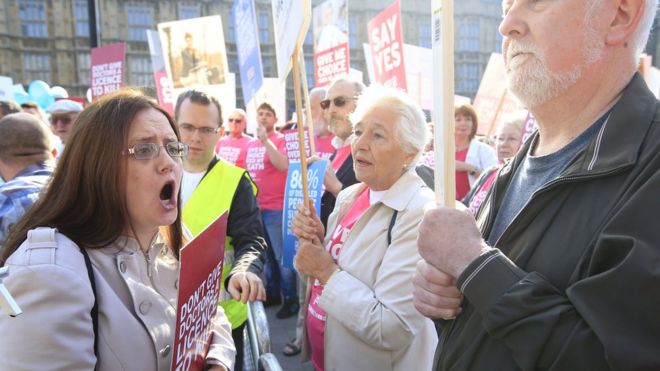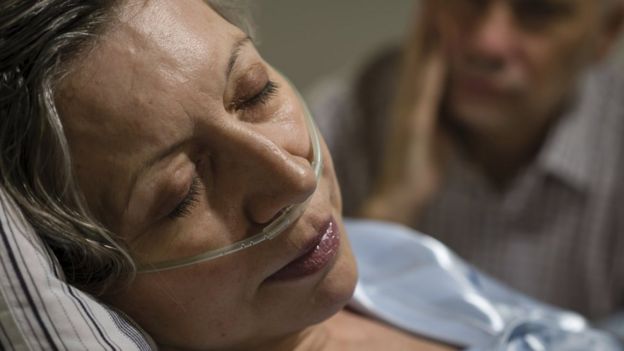Assisted Dying Bill: MPs reject 'right to die' law
 Image copyright PA
Image copyright PA
MPs have rejected plans for a right to die in England and Wales in their first vote on the issue in almost 20 years.
In a free vote in the Commons, 118 MPs were in favour and 330 against plans to allow terminally ill adults to end their lives with medical supervision. In a passionate debate some argued the plans allowed a "dignified and peaceful death" while others said they were "totally unacceptable".
Such legislation has repeatedly failed to pass through parliament.
A doctor-assisted dying bill was rejected by MPs in 1997 and attempts to take legislation through the House of Lords ran out of time before the general election this year.
The latest attempt was brought before the Commons by Rob Marris, the Labour MP for Wolverhampton South West.
Under the proposals, people with fewer than six months to live could have been prescribed a lethal dose of drugs, which they had to be able to take themselves. Two doctors and a High Court judge would have needed to approve each case.
Prime Minister David Cameron was not present at the debate, but a spokesman said: "The Prime Minister has made his views clear on this issue before, he is not convinced that further steps need to be taken and he is not in favour of an approach that would take us closer to euthanasia."
He said there were too many "amateur suicides, and people going to Dignitas" and it was time for parliament to debate the issue because "social attitudes have changed".
Mr Marris added: "The law in England and Wales has not got the balance right.
"This Bill would provide more protection for the living and more choice for the dying."
Mr Marris said he did not know what choice he would make if he was terminally ill, but said it would be comforting to know that the choice was available "to have a dignified and peaceful death at the time of my choosing".
 Image copyright Thinkstock
Image copyright Thinkstock Her impassioned speech concluded: "We are here to protect the most vulnerable in our society, not to legislate to kill them. This bill is not merely flawed, it is legally and ethically totally unacceptable."

The law on assisted dying around the UK
Euthanasia, which is considered as manslaughter or murder, is illegal under English law.The Suicide Act 1961 makes it an offence to encourage or assist a suicide or a suicide attempt in England and Wales. Anyone doing so could face up to 14 years in prison.
The law is almost identical in Northern Ireland.
There is no specific law on assisted suicide in Scotland, creating some uncertainty, although in theory someone could be prosecuted under homicide legislation.

She was one of many MPs to argue that it was difficult to determine whether someone had six months to live.
She also warned: "[The bill] changes the relationship between the doctor and their patient, it would not just legitimise suicide, but promote the participation of others in it."
But he warned that his guidelines had shortcomings without a change in the law.
He said: "We have arrived at a position where compassionate amateur assistance from nearest and dearest is accepted, but professional medical assistance is not unless you have the means of physical assistance to get to Dignitas.
"That, to my mind, is an injustice we have trapped within our current arrangements."
"We should support letting people live every day of their lives till the end," she said, and she urged MPs to vote for "life and dignity, not death".
Justice Minister Mike Penning closed the debate, saying he opposed the bill for two reasons - firstly because he didn't think it should be an excuse that "we can't control pain in the 21st century".
He also said he was against suicide because he had seen the painful aftermath of far too many.
Reactions to the vote
Sarah Wootton, chief executive of Dignity in Dying, said the result of the vote showed "how ridiculously out of touch MPs are with the British public on the issue"."With the overwhelming majority of the public supporting the Bill it is an outrage that MPs have decided to retain the current law which the former Director of Public Prosecutions, the House of Lords, and the public all believe is leading to suffering and injustice for dying people."
Dr Peter Saunders, campaign director of Care Not Killing, welcomed the rejection of the legislation, saying the current law existed to protect those who were sick, elderly, depressed or disabled.
"It protects those who have no voice against exploitation and coercion. It acts as a powerful deterrent to would-be abusers and does not need changing."
But Rabbi Dr Jonathan Romain, chair of Inter-faith leaders for Dignity in Dying, said he was saddened by the failure of the bill because it dashed the hopes of those "who wish to avoid ending their days in pain or incapacity".
He said he hoped MPs would revisit the issue at a future date.

Where others stand on assisted dying
- The Archbishop of Canterbury, Justin Welby, said the bill would mean suicide was "actively supported" instead of being viewed as a tragedy.
- One of his predecessors, George Carey, backs assisted dying saying that there's nothing dignified about experiencing pain at its most awful.
- The campaign group Care Not Killing said the legislation was "dangerous" because it would send out a chilling message about how we value and treat vulnerable people.
- While the group Dignity in Dying says the "overwhelming majority" of the public support assisted dying.
- The British Medical Association, the doctor's union, opposes all forms of assisted dying.
- And the Royal College of Nursing takes a neutral stance.
No comments:
Post a Comment